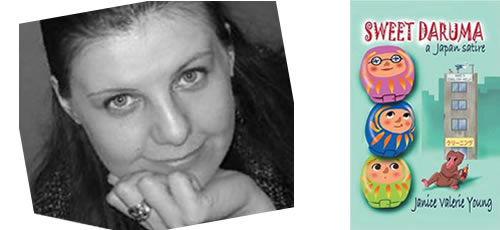 |
 |
 |
 |
 |
 |
 |
Sweet Daruma: a Japan satire
Modern Japan and the art of humorous pathos.
An Interview with Janice Valerie Young, author of Sweet Daruma: a Japan satireBook Description:
Magda is thrilled to leave her globalization-protesting boyfriend in Toronto and head to Tokyo to teach English conversation…or so she thinks. Upon her arrival she is whisked off to save the life of a suicidal salaryman with the help of a strategic idiom. Magda has unwittingly joined the Anne of Grey Tokyo Emergency English Response Team, and she better brush up her vocabulary in a hurry, because the English emergencies keep coming. Suddenly caught up in the politics of English and pop culture in Japan, Magda soon realizes to expect the unexpected. She’s now the student–and Japan definitely has a lot to teach.
Q. Your book has an intriguing title. Can you tell us about it and how the idea came about?
I wanted the title to reflect the element that ties all the characters and the narrative together—there’s an idea in the story that Japan needs something new, but not another disconnected high-tech gadget—instead an idea, a gift to society, if you will, that connects the old with the new, the folkloric with the modern. I’ve always been enchanted by darumas and find the whole idea of daruma apartments not only feasible, but fantastic. And I felt the need to point out that the novel is a satire, lest readers take the events in the story literally!
Q. The novel confronts the timely and controversial issue of youth prostitution in Japan. What prompted you to focus on this?
The more I learned about this issue, the more perplexed and disturbed I became. The thought of a girl prostituting herself to buy a designer bag was really beyond the scope of my imagination, but there it is, happening in Tokyo, in my city! This got me to thinking, and though some may say the idea of teenage urine sellers in my story is too much of a stretch, it’s not—a friend of mine actually heard a couple of men discussing it on the train. So I decided why not take it a step further? And I did, which you’ll read about at the end of the book. I wanted readers to ask themselves, “What is more disgusting: underage sex for a bag, or urine and “number 2” selling?”
Q. The characters in your book are struggling with their place in Japanese society—do you see this as a naturally more difficult issue for non-Japanese?
I think twenty or thirty years ago my answer would be an unequivocal “yes—of course it is more complicated for non-Japanese to resolve identity issues in Japan,” but today I believe it is just as challenging and more traumatic for young Japanese to determine where they fit in. The paradigms that served their parents and grandparents have shifted and crumbled. The security is gone. My hope is that this is viewed more as an opportunity than a negative. I can’t wait for more young, open-minded voices to be heard!
Q. Obviously, humour is one of the main techniques you employ in the book. But it’s often a humour with pain. Would you agree?
Yes. I was aiming for a humourous pathos. To me that’s what really touches the nerve centre, the soul. Whether you’re a Westerner or a Japanese, an animal or a gangster, you can relate to sympathetic pity, and sometimes the only thing you can do is laugh…if you don’t want to cry!
Q. Was it difficult to write from the point of view of so many diverse characters? How did you manage to get inside the male Japanese mind?
Living with a Japanese man is a good start! But seriously, being a writer involves imagining characters from the inside out. I was attempting to portray the situations of both men and women, Japanese and non-Japanese from various angles. There hasn’t been enough discussion about Western women in Japan and I wanted to explore, debunk, and clarify a few things about them. Also, I wanted to show the good, bad, and the ugly that exists in all of us, in varying degrees.
Q. What are your plans for the book? Where do you see it going?
I’ve got big plans! I think the rest of the world needs to learn about modern Japan and I’m sure they are interested, so it’s simply a matter of promotion. I studied advertising and that’s the best lesson I learned—PROMOTE! No one will read your book if they don’t know it exists. Cutting through the clutter though, that’s another challenge altogether. I would like a large publishing house to buy the rights to the book, along with a film company. I think Sweet Daruma would make an incredibly entertaining movie.Q. How has local media reaction been?
I’m still in the process of local promotion, and I am really happy with the generosity and kindness of the local media. I think as English-speakers in Japan we’re spoiled that way—just pick up the phone and you can basically talk to the newspaper and magazine book reviewers directly. No large bureaucracy to get through, and not as much competition as you’d get in a native-English market.
Home
•
Naturopath •
Aromatherapist •
SHOPPING ONLINE • Contact
Us
Healers,
Teachers & Creative People • Magazine
- Online • Useful
Info
Meditation,
Mantras & Prayer • Vegetarian
Info • Famous
Vegetarians •
Links

